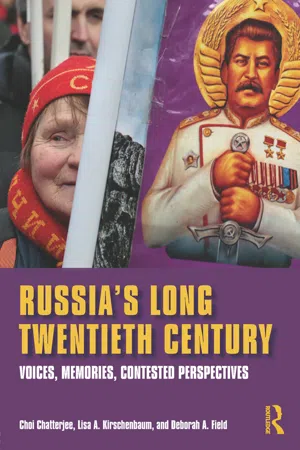
Russia's Long Twentieth Century
Voices, Memories, Contested Perspectives
- 278 pages
- English
- ePUB (mobile friendly)
- Available on iOS & Android
Russia's Long Twentieth Century
Voices, Memories, Contested Perspectives
About this book
Covering the sweep of Russian history from empire to Soviet Union to post-Soviet state, Russia's Long Twentieth Century is a comprehensive yet accessible textbook that situates modern Russia in the context of world history and encourages students to analyse the ways in which citizens learnt to live within its system and create distinctly Soviet identities from its structures and ideologies.
Chronologically organised but moving beyond the traditional Cold War framework, this book covers topics such as the accelerating social, economic and political shifts in the Russian empire before the Revolution of 1905, the construction of the socialist order under Bolshevik government, and the development of a new state structure, political ideology and foreign policy in the decades since the collapse of the Soviet Union. The authors highlight the polemics and disagreements that energize the field, discussing interpretations from Russian, émigré, and Western historiographies and showing how scholars diverge sharply in their understanding of key events, historical processes, and personalities.
Each chapter contains a selection of primary sources and discussion questions, engaging with the voices and experiences of ordinary Soviet citizens and familiarizing students with the techniques of source criticism. Illustrated with images and maps throughout, this book is an essential introduction to twentieth-century Russian history.
Frequently asked questions
- Essential is ideal for learners and professionals who enjoy exploring a wide range of subjects. Access the Essential Library with 800,000+ trusted titles and best-sellers across business, personal growth, and the humanities. Includes unlimited reading time and Standard Read Aloud voice.
- Complete: Perfect for advanced learners and researchers needing full, unrestricted access. Unlock 1.4M+ books across hundreds of subjects, including academic and specialized titles. The Complete Plan also includes advanced features like Premium Read Aloud and Research Assistant.
Please note we cannot support devices running on iOS 13 and Android 7 or earlier. Learn more about using the app.
Information
12 Russia after 1991
Introduction
Table of contents
- Cover Page
- Table Of Contents
- Russia's Long Twentieth Century
- Empire and modernization
- Modernity, war, and revolution
- Constructing the socialist order
- Making a new world and new people
- Revolution from above
- Making sense of Stalinism: enthusiasm and terror
- The Great Fatherland War and the origins of the Cold War
- Cold War, culture, and everyday life
- Paradoxes of the Thaw
- An era of stagnation?
- Gorbachev and the truth paradox
- Russia after 1991: change and continuity